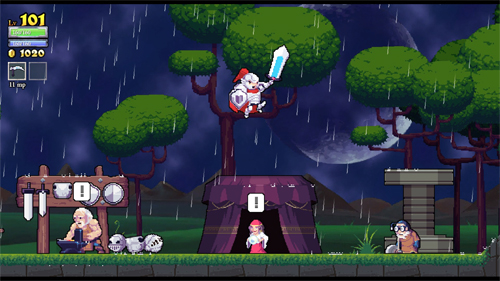Rogue Legacy is a story about family. It’s different from a lot of similar stories, though, in that most involve an internal strife that gets resolved in a touching scene, culminating in old grudges being set aside in favor of the cathartic reaffirmation of familial ties. There’s usually a reunion. Someone gets married.
Dying—you know, the family business

Rogue Legacy is a story about family. It’s different from a lot of similar stories, though, in that most involve an internal strife that gets resolved in a touching scene, culminating in old grudges being set aside in favor of the cathartic reaffirmation of familial ties. There’s usually a reunion. Someone gets married.
Rogue Legacy is more about your children’s children running into a castle and hitting ghost horses with swords. So, there are differences.
The game has been touted as a “roguelite” by developer Cellar Door, meaning that they set out to create a more approachable roguelike (a label that has become synonymous with unforgiving, tough-as-nails gameplay and severe punishments for player death). Was Cellar Door able to successfully tread the tenuous roguelike line, or did their compromises cause Rogue Legacy to come up short?
In the game, you are forever storming an ever-changing castle, pushing deeper and deeper against increasingly difficult resistance. Your objective is to slay four bosses, thus clearing your way to the final encounter. Doing so in one run is nigh impossible (some enterprising individual will eventually prove me wrong, but trust me; it’s really hard), so death is inevitable. Unlike in most games, though, you don’t simply respawn. Instead, you just spawn. Subsequent runs in Rogue Legacy are played as one of three children of the now-defunct former hero. Each child has a range of traits that make the game easier, harder or weirder.
Traits range in effect and severity. Some, like colorblindness and nostalgia, simply apply filters to the screen (a black-and-white filter for colorblindness, a sepia-toned filter for nostalgia) that only alter the game visually. Some traits alter the gameplay altogether. CIP (Congenital Insensitivity to Pain) removes your health bar. Dementia brings enemies that cannot harm you or be harmed, and occasionally your hero will hear sinister noises. Vertigo flips the castle on its head, forcing you to play on the ceiling. (Yes, this is maddening. Yes, you need to try it at least once.)
With so much emphasis on traits passed down through the generations, you might be inclined to think that, through selective breeding, you could craft an Ubermensch the likes of which the world has never seen before, so laden in positive traits that enemies quake in his or her wake. Rogue Legacy isn’t quite Eugenics: The Game, though. The qualities and classes of each heir are randomized, meaning that you can’t choose the traits they inherit. Occasionally this randomization forced me to make compromises in terms of the negative effects I was willing to bear in exchange for that one trait that could make my run easier.
There are ways of permanently enhancing your lineage, though. Points can be added to a skill tree using the gold you collect on a run. Skill tree customization, which can range in scope from health increases to unlocking entirely new classes, effects all subsequent generations, the in-game conceit being that you are upgrading your family castle and thus the enhancements survive through the ages. Runes and armor upgrades, also bought with gold, offer permanent enhancements. Runes attach to armor and can alter your character’s abilities, enabling such features as double-jumping and life drain, among others.
Rogue Legacy
Price: $15
Platform: PC
4/5 Stars
The central bummer in Rogue Legacy stems from these permanent enhancements, which steadily increase in cost. At some point I felt like I was grinding areas I had already conquered in search of the gold needed to upgrade my lineage, thus allowing the next generation to forge deeper into areas I had already been to but was simply too underpowered to make any progress in.
An entire run devolving into a gold-hunting mission seems like a negative mark on the game, and it was in fact rather tedious. But Rogue Legacy has been designed around this tedium, sort of. The Miner class (classes are also randomized, much like traits) is designed so that the player receives an greater percentage of the gold collected. Of course, since classes are randomized, you might find yourself stuck between a rock and a hard place in terms of your monetary needs—waiting for the right class to pop up so that you can do what you already know you need to do. The same goes for bosses, many of which have weaknesses to certain classes or traits built in. You just have to wait for those classes and traits to materialize. In the end, the grind feels like padding masquerading as difficulty.
Rogue Legacy is a fascinating mixture of things I really like and a thick layer of filler that seems to give way at a moment’s notice. Exclusively for the PC, it is a tragedy that this game isn’t on the consoles so that it can reach a wider audience. Cellar Door is onto something great with Rogue Legacy, but the game needs a little more time in the oven. Regardless, it’s worth picking up Rogue Legacy, if only to experience the eccentric world the developers have created.






